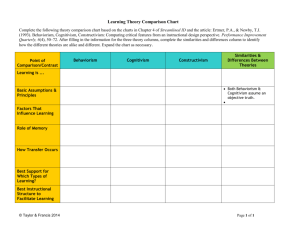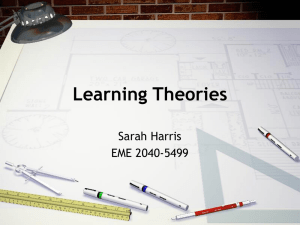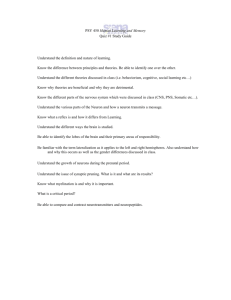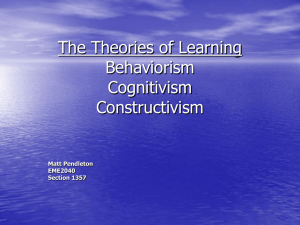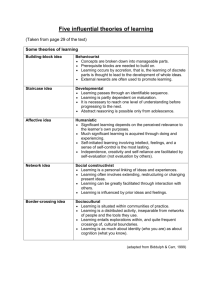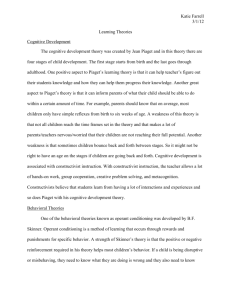Perspectives on Learning Paradigms
advertisement
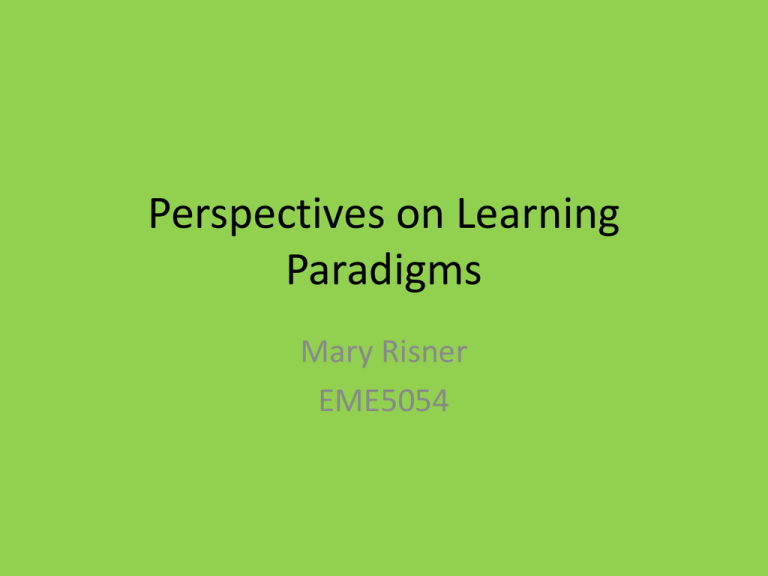
Perspectives on Learning Paradigms Mary Risner EME5054 Goals of Educational Technology Organization of Processes Facilitating Learning Organization of People, Materials, Settings Facilitating Learning Roles • Learner Emphasis on interests and abilities, managing own learning, controlling mental processes. • Facilitator Influences learning process, does not control it. Learning vs. Instructional Theories • Learning Theory- Describes how humans learn. • Instructional Theory- Prescribes teaching methods and best conditions to acquire new knowledge and skills. Why is Understanding and Awareness of These Theories Important? How we see learning….(teacher vs. learner control) Personal beliefs on learning theories How we teach in a classroom and what policies we support Major Learning Theories Theory Key Thinkers Key Characteristics Behaviorism Skinner, Pavlov -Operant /respondent conditioning, view that learning can be observed Cognitivism Piaget, Vygotsky -View of learning as internal process. -Learners use memory and thought to create, organize, and store ideas Constructivism Von Glaserfeld, Lakoff, Piaget, Vygotsky -From the basis of social constructivism, elements of cognitivism, collaborative and problem-based learning, learning through and for authentic experiences Behaviorism Contributions to Ed Tech/Facilitating Learning Limitations Templates and frameworks for instruction Institutions slow to accept programmed instruction at institutions due to power struggles, institutional inertia, conflict of interest Application not limited only to cognitive domain Lacking social interaction and collaboration Concepts of: Feedback, teacher –student interaction, sequential units, material in small steps, self-pacing No focus on internal processes Ed Tech focus: Teaching machines, programmed instruction, direct instruction, computer assisted instruction, personalized system of instruction. Within Behaviorism Respondent learning: Involuntary actions, classical conditioning (Pavlov’s dog) Operant learning: Stimuli-responseconsequence Cognitivism Contributions to Ed Tech/Facilitating Learning Limitations Presentation, visual and auditory learning Applies primarily to cognitive domain and not to motor skills or attitudes Organization of content to make things easy to remember Linking to prior knowledge From reception to engagement, connect to real world Ed Tech Focus: audio-visual media, message design, digital multimedia No social or collaborative efforts included in learning Within Cognitivism Piaget: Fixed stages of development Information processing theory: how info is stored in memory Schema theory: New material integrated with existing cognitive structure Neuroscience: Imaging technologies to observe neurological activities Constructivism Contributions to Ed Tech/Facilitating Learning Limitations Apprenticeship: scaffolding, modeling, mentoring, coaching New research on “minimal guidance” concerns Construction of own learning Does constructivism work depending on audience? i.e. Beginner vs. intermediatedoes it overload learner cognitively and interfere with cognitive processing? Involvement in creative thinking for problem-solving, importance of authenticity of experience Media vs. methods Collaboration and group work Ed Tech Focus: Engaged learning, need for change in learning assessment methodology focused on performance Other Learning Theories Critical Theory Horkheimer (social theory) View of understanding and critiquing society through the social sciences and desire to bring about social change Eclectic Reeves Flexible use of principles from all learning theories to reach goals in their applied context Readings • Before the readings I never thought about which learning theories I believed in or how I was affected by them in my teaching over the years. I only had a basic background and found it very valuable to learn more on the aspects of the theories as they have developed through time and how they have contributed to understanding learning processes. Readings (cont.) It was interesting how the readings made me more aware and helped me identify which learning theories have influenced my teaching practices so I could actually pinpoint and contemplate where I actually stand on these issues based on research over time and not only on what might be the current trend(s) in education. My Personal Views • For whatever reason I think this way, I would definitely say I am very much a cognitivist as a learner and a teacher. On a personal and professional level, I see the benefits of organizing thoughts and concepts and making associations by building on prior knowledge and experience. Humankind by nature is driven to organize and classify the world around us and most people are comforted by the familiar. So it would only make sense that the cognitivist assertions hold some substance for how people define and shape their knowledge base. • I was enlightened by the detailed explanation of the significance of behaviorism and where it has made strong contributions in the realm of “soft technology” since I had mainly associated it with tedious drill for skills techniques that can be pretty boring as a methodology , but may have a value in specific contexts. My Views (cont.) My experience as a foreign language and ESL teacher is a natural fit to the constructivist way of thinking through the use of authentic materials, collaborative activities, and real world application. Years ago, I originally began teaching with a more teacher controlled focus due to my own educational experiences, though in recent years of teaching opportunities I have been training myself to effectively give learners control in the classroom and I try to practice the learner-centered approach in teacher training workshops. Evidence of My View of Learning Paradigms In the Foreign Language Classroom I am currently in more of an administrative position at UF so have to look back a few years in retrospect to how the views of learning theory are prescribed in the classroom. My experience has never been through teaching online, but many foreign language activities have great potential for use in an online course. Behaviorist Perspective Choral repetition of new vocabulary would primarily be a stimulusresponse with feedback. Through new software programs, individuals can practice their pronunciation individually, record themselves, and be rated on how close they are to a native accent. The traditional teacherstudent/question-response is another format where students practice in unnatural drills and can respond correctly without even knowing what they are saying. This can take place orally, in multiple choice written format, and especially in verb conjugations. Cognitivist Perspective The visual and auditory components are obviously huge in foreign language study where recordings and films have been used in the past, but are little by little being replaced with short video clips like those found on You Tube or from any other media source available on the net. The presentation of grammar and vocabulary as building blocks where one must learn and master certain forms before proceeding would also be a result of cognitivist theory. The use of case studies can be effective in terms of scenarios to learn about cultural sensitivity and intercultural relations. Constructivist (cont.) The interaction with “realia” or authentic artifacts from the target language country is definitely the result of a constructivist perspective. With new technology, more multimedia sources are available for use in the classroom. Traditional collaborative work that was done only in the classroom with non-native speakers can now be done through technology with students in other places. Constructivist (cont.) Even as I work with language teachers now, the interest is there to encourage communication and acquisition of real world applicable skills, but many schools still focus on just getting through the grammar of so many chapters without concern for mastery or practicality for the students once they are in the workplace. Simulations will be a very valuable tool in foreign language by putting students in real-life situations to prepare them culturally and linguistically. Inquiry and problem-solving is approached through webquests that encourage students to find information and solutions on their own or in a group for a given situation. First Step in Reflection as an Educator Overall, I would say I have an eclectic view of learning theories and elements of each affect the instructional methodologies I have used in teaching and teacher training now and in the past. Reflecting on and becoming aware of what we as individuals believe is a start . Then there are questions to be answered on how to ensure that best practices come from contemplation of all learning paradigms, and not only by what happens to be a current trend. How Can We Make Sure Our Paradigms Guide Us Well As Educators? • How do we as teachers keep reflecting on our views of learning so that it has a positive and influence on learning environments and implement best practices in the classroom? • Is how we teach a product of our own past learning experience, training, or a matter of personality? Is it Nature or Nurture? How Much is the Way We Teach Due to Our Present Circumstances? Lack of training in classroom management for effective group work Lack of training for creative lesson plans Lack of time for planning Large classes Limited knowledge of subject area to give students free reign on topics Fear of change from traditional approaches Knowing where to draw the line between guiding, dominating, or not giving enough direction Further Research Needed Minimal Guidance Question • As much as I agree with the many virtues of constructivism, I have wondered about the question of what level a learner has to be at to benefit from minimal guidance and will be interesting research to follow. • Kirschner hypothesis: “Minimally guided learning environments subject learners to a heavy cognitive load that interferes with use of their cognitive processing abilities. “ p. 37 *Kirschner, Sweller, Clark (2006) Further Research Needed Media vs. Methods • The Kozma (1991) argument of learning interactively with media instead of from media (Clark, 1983) is another interesting area that should continue to be examined to confirm how learning best occurs as more online learning modules are developed. References • Clark, R. E. (1983). Reconsidering research on learning from media. Review of Educational Research, 53(4), 445– 459. • Kirschner, P. A., Sweller, J., & Clark, R. E. (2006). Why minimal guidance during instruction des not work: An analysis of the failure of constructivist, discovery, problem-based, experiential, and inquiry-based teaching. EducationalPsychologist, 41(2), 75–86. • Kozma, R. B. (1991, Summer). Learning with media. Review of Educational Research, 61(2), 179–211.
